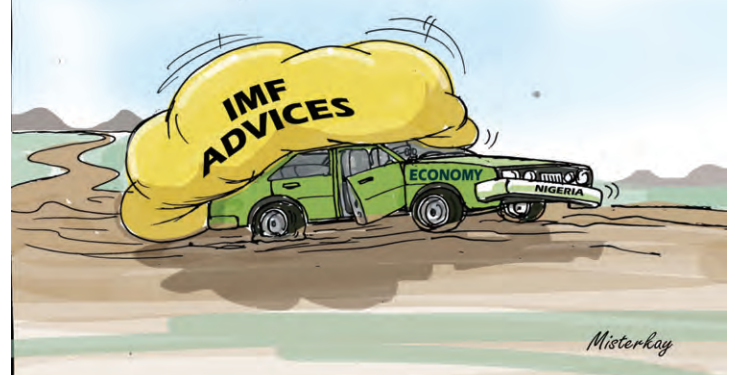The International Monetary Fund (IMF) recently stirred the hornet’s nest in Nigeria when it encouraged the federal government to phase out electricity subsidy in the country. The Bretton Woods institution, in its ‘Post Financing Assessment (PFA) report’ which it recently released, said the federal government had overwhelmed itself with shouldering the power subsidy and that removing the subsidies is the mechanism for Nigeria to restore macroeconomic stability.
It also urged government to redirect resources that would be saved from paying subsidies towards more targeted and impactful social welfare programmes, like cash transfers to the most vulnerable of the population, in the interim.
Last year, electricity subsidies between January and September 2023 gulped N375.8 billion, with consumers paying a total of N782.6 billion for the service. This year, the federal government has proposed N1.6 trillion as subsidy, with the minister of power, Adebayo Adelabu, declaring that it is unsustainable.
However, the IMF recommendation is coming at a time when the country’s citizenry is struggling with a cost-of-living crisis brought on by the removal of fuel subsidy, on the advice of the same IMF and the World Bank.
The removal of petrol subsidy on May 29, 2023, was aimed at addressing the nation’s fiscal challenges, but it has worsened living standards, with the disposable income of Nigerians experiencing a continuous decline amid inflationary pressures. Economic hardship has led to street protests in parts of Nigeria, and more are likely to follow as the cost-of-living spirals out of control, pushing the prices of essential foods, commodities and services out of the reach of most Nigerian households.
Even before the petrol subsidy removal came to aggravate an already bad situation, Nigeria was already adjudged the poverty capital of the world, with the government-owned Bureau of Statistics (BOS) in its 2022 report showing that about 63 percent of Nigerians (or 133 million people) were living in multi-dimensional poverty.
In the light of all that has transpired of late, it is not surprising that many local authorities and organizations have told the President Tinubu administration to reject the IMF proposal. Leading the line is the Nigeria Labour Congress (NLC) which described the Bretton Woods institutions as anti-people and accused them of pushing Nigeria to the brink of economic collapse.
The NLC argued that higher electricity tariffs would hurt the competitiveness of the Nigerian manufacturing sector, which is already struggling with low productivity, high costs, and poor infrastructure. Also, the IMF had not considered the low purchasing power of the people.
Civil Society Organizations (CSOs) in Nigeria have also joined Labour in dismissing the IMF counsel, and insisted that the only advice government should consider now is one that will lessen the suffering of Nigerians and improve their living conditions.
“IMF and the World Bank are pushing Nigeria to the precipice by demanding higher energy rates and further devaluation of the Naira when the people are yet to recover from the trauma and confusion of the extant rates and devaluation. It is basic knowledge that high energy rates are not good for competitive manufacturing. So, what do they want?”
Awwal Musa Rafsanjani, who spoke on behalf of Transparency International (TI), the Civil Society Legislative Advocacy Centre (CISLAC) and the Transition Monitoring Group (TMG), said.
The Manufacturing Association of Nigeria (MAN) and many of the prominent local economic experts spoke in similar vein: that the IMF proposal will further de-industrialize Nigeria, a country where high operating capital has already caused many industries to either close shop or relocate to neighbouring countries.
As a newspaper, we align with the above reasons given for rejecting the IMF advice. The Bretton Woods institution’s approach to economic policy formulation seems to be insensitive to social consequences for the citizens concerned. This week, two reputable organizations, the African Development Bank and the Red Cross, warned about the danger of the hardship in Nigeria tipping over.
Actually, AfDP listed Nigeria, Angola, Ethiopia and Kenya as countries were rising cost of living due to removal of subsidy and currency devaluation could lead to social unrests, while the Nigeria Red Cross Society described the hunger in the country as alarming and demanding immediate and collective action to ameliorate the situation. It said more than 25 million Nigerians were facing acute hunger and in urgent need of food aid.
What the IMF should do is to propose ideas that will help Nigeria to survive the economic dislocation as a result of petrol subsidy removal and other issues around handling of government finances.
Its suggestion as a way of mitigating the adverse effects of its proposal through cash transfers to underprivileged segments of society shows a level of thoughtlessness that one should not associate with such an institution: for a country like Nigeria with no reliable social register and where such administration of palliatives had been enmeshed in corruption, the recommendation is unfriendly.
That raises the question about the IMF and the World Bank’s motives for developing countries like Nigeria. Could they be part of the problem? Not a few believe that they have continued to pursue the imperialistic goals of their founders to destroy the economies of developing nations and make them perpetually vulnerable to external manipulation.
It is pertinent to point out that there are no developed countries, including the United Kingdom, the United States, France and Germany, that do not give one form of subsidy or another to their citizens and the IMF and the World Bank never see anything wrong there.
Consequently, the federal government should look for homegrown solutions to solve the country’s problems rather than looking for help where there is none.



